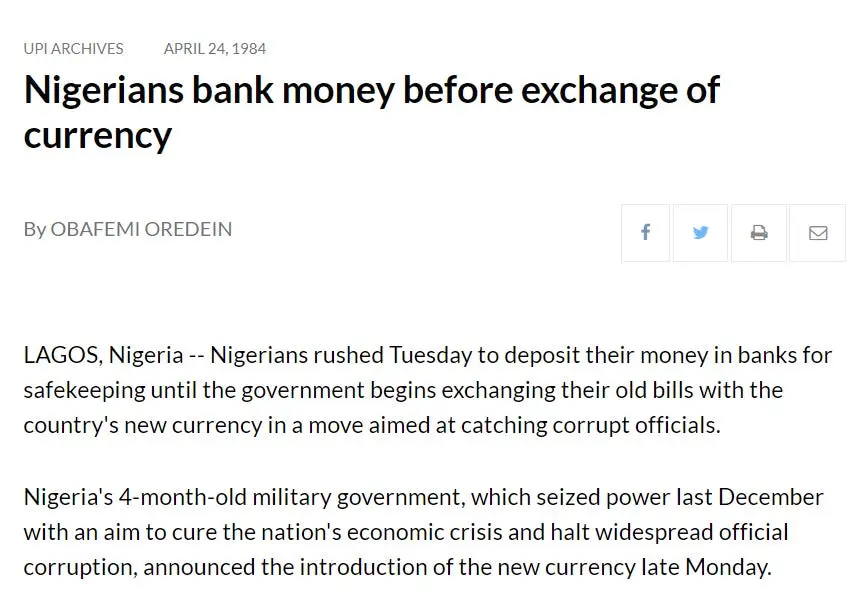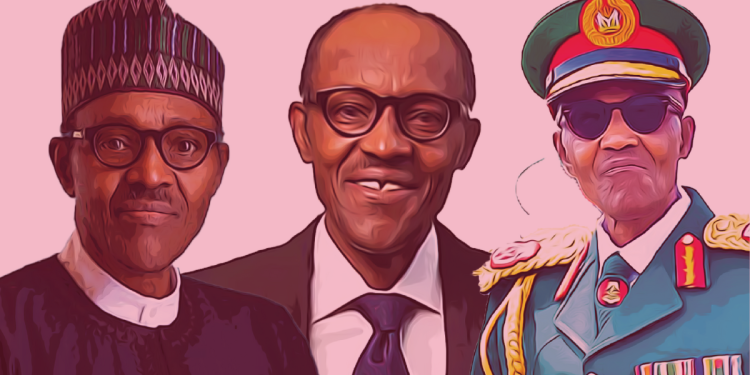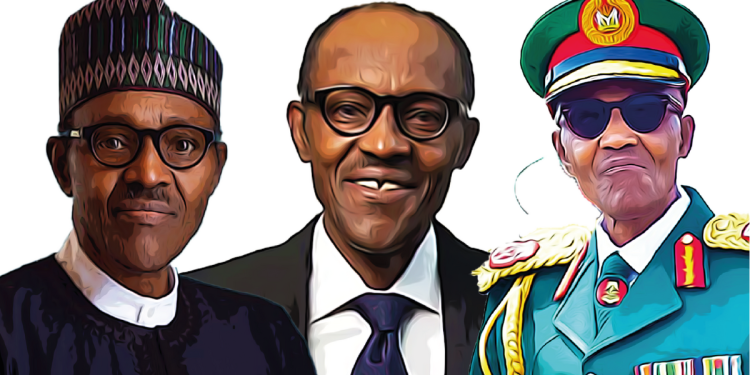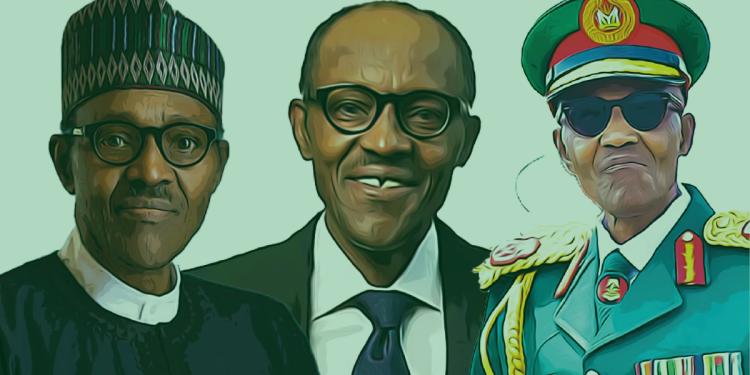87 killed, 39 injured in Plateau massacre (Premium Times, May 19, 2023).
In the last 96 months, news headlines like this no longer get people sober or disturbed.
As with life in the ungoverned wild, Nigerians have learnt that bloodshed is the order of the day in a state of nature called Nigeria.
In his eight years in office, Muhammadu Buhari led the people to become numb to pain, to move on with apathy towards evil, helpless, as they carry on with life side by side with kidnaps, killings, and all unthinkable forms of human suffering.
“There is evil, ever around – fundamental system of government – quite incidental.
So what are my chances of honest advances? I’d say low.
Better to win by admitting my sin than to lose with a halo.”
The above lines were extracted from the last conversation Che (Antonio Banderas) and Eva (Madonna) had, in a subliminal waltz into the shadowy recesses of the mind in the 1996 motion picture Evita.
Che, the nagging conscience of the nation, probed Eva, Argentina’s popular first lady in the late 1940s, about the first family’s misrule of the country, just as the couple, Eva and General Juan Peron, neared the end of their life together in political power.
And this certainly is the kind of conversation that troubles Nigeria’s First Lady, Mrs Aisha Buhari too, whenever she escapes the other room into the moral room in intercourse with the conscience of the nation.
Thus, when General Muhammadu Buhari’s 8-year mandate trickled out to 8 months last October, Aisha Buhari, in a moment of political contrition, apologised for her husband’s misspent years in office.
By the time you are reading this tribute to the Buharis, President Buhari would have just 8 days to go.
Looking at his misspent moments in office, Aisha Buhari’s husband recently apologised too and begged for forgiveness for the hurt he’s brought to the people.
At last, Mr Buhari took to heart the nudgings of his significant other in the other room.
Yet, Mr Buhari need not apologise for anything. A leopard need not apologise for its stripes nor a snake for its venom. It’s who they are.
Whether Buhari annexes the State through a bullet in 1983 or through a ballot in 2015, he is the same person. He is who he is.
Regardless, for Buhari, his exit on May 29, 2023, is a historic and glorious one.
He would be all smiles on that day when he remembers the way he was disgraced out of office as the head of state in 1983. To think that he now leaves in peace and retires to the comfort of his home(s) and not a bungalow in Benin.
But if he (or his type) ever returns to rule this country, in this life or another, he will “hurt” many again. He will exhibit these 8 points of pain again.
We call it the 8 B.U.H.A.R.I.A.N markers.
1. Beautiful Markers
Buhari possesses some admirable outward attributes. Besides a winsome smile and a sense of humour, his most outstanding feature is an above-average height.
Buhari is the tallest Nigerian leader since the civil war. Little wonder why he stood back and stared long when he saw the tallest cadet in the Nigerian Army.
Buhari also comes first in several other records.
First Military Head of State to sack a civilian President without firing a single shot. This was followed by Sanni Abacha who also removed a civilian Interim President without a single shot.
First President to have served as a Minister of Petroleum twice. Once as a soldier and the next as a civilian President.
First presidential candidate of the All Nigeria People’s Party (ANPP).
First presidential candidate of the defunct Congress for Progressive Change (CPC).
First presidential Candidate of the ruling All Progressive Congress.
First opposition candidate to defeat an incumbent President in Nigeria. He defeated President Goodluck Jonathan in 2015, after his 3 previous failures in 2003, 2007, and 2011.
But what did Muhammadu Buhari do with his fine features and first feats when he served his country?
2. Ugly Markers
Buhari supervised certain ugly acts of international overreach both as a military and civilian leader in Nigeria.
Buhari would go all the way to the gates of hell to catch or crush his perceived political enemies.
His military government illegally drugged and kidnapped Umaru Dikko in London and squeezed him into a plastic bag marked as “Diplomatic Baggage” for onward shipping back to Nigeria to face trial under Buhari. The embattled former Minister of Transport under the previous government of Shehu Shagari was accused of graft. However, the British airport staff foiled this international crime right just before the victim was loaded onto the waiting Nigerian Airways Boeing 707.
Buhari’s government repeated this Gestapo-style crime at his second shot at Nigeria’s highest office. This time they waited for their kidnap prospect to leave London and get to Kenya. Buhari’s men succeeded in kidnapping and returning Nnamdi Kanu from the East African country to face trial for treason in Nigeria.
So, you see, Buhari need not apologise for kidnapping perceived enemies against international protocol. It is a consequentialist doctrine deeply entrenched in his unconventional Buharism.
He will do it again.
3. Hypocritical Markers
The easiest way to describe a hypocritical person is to frame him or her as someone that is hyper-critical (overcritical) of others for particular wrongdoing but hypo-critical (that is under-critical) of themselves for the same flaws.
Buhari who touts himself as an anticorruption crusader said “Abacha did not steal” Nigeria’s money.
This same Buhari singlehandedly smothered the mandate of millions of Nigeria when he removed President Shehu Shagari in 1983 and locked up many governors for alleged corruption. Some were mentally and physically manhandled and died shortly after. They include Governor Olabisi Onabanjo of Ogun State.
Commenting on Buhari’s double-faced testimony on the Abacha loot in his post, ‘Hypocrisy In The Face Of Truth: The Abacha Verdict’, Akintokunbo A Adejumo regretted that: “One of the central evils of our society is hypocrisy.”
He cited Noam Chomsky’s description of hypocrisy as the refusal to “apply to ourselves the same standards we apply to others, which promotes injustices and social inequalities in a framework of self-deception, which includes the notion that hypocrisy itself is a necessary part of human behaviour and society.”
Buhari also said politicians should not seek medical attention abroad. But that applies to others except him, his son and family members.
Many were shocked the first time he travelled out to treat an ear infection in the UK.
Consistent with the typical Buharian hypocrisy, after her husband spent 8 months out of his 8 years outside the country on medical tourism, Aisha Buhari, 10 days to her exit from Aso Rock, now strongly approves the state house clinic and advises incoming presidents and their families against travelling abroad for medical treatments.
4. Austerity Markers
People who lived through Buhari’s period of border closure between 1984 and 1986 recall “the poverty, hunger, despair, the disappearance of goods from the markets and supermarket shelves, the essential commodities queues, the market raids by soldiers to “liberate” goods not being sold at government fixed prices etc.”
Buhari believes in locking up the system and forcing economic agents to mass produce to increase output to remain globally competitive.
It is typical of Buhari to institute austere measures like border closures. Of the 3 times Nigeria has closed its borders, Buhari closed it twice for economic reasons. Obasanjo cited its neighbour’s complacency about cross-border crimes.
Obasanjo’s government cited “escalating cross-border crime including armed robbery, massive smuggling of goods and human trafficking which it said its smaller neighbour was not doing enough to curb.” The border closure was only with Benin Republic and lasted for just 1 week after both Presidents met to discuss the matter in Badagry.
For Buhari, his first border closure lasted 2 years (February 1984 to February 1986) “in a futile attempt to curb smuggling of petroleum products out of Nigeria.”
His second border closure lasted 1 year and 4 months (August 20, 2019 to December 16, 2020).
Buhari’s media aide, Tolu Ogunlesi, acknowledged that the 2019 border closure was meant to serve economic ends, arguing that it was not some petty trade policy: “The border closure was always about much more than rice or petrol or tomatoes and even guns, it was more about enforcing compliance with existing trade rules, and about discouraging State-endorsed flouting of these rules and agreements.”
Despite Buhari’s austere economic policies, growth in output was reduced to record levels, and inflation and unemployment skyrocketed to unprecedented levels, with Nigeria earning the ignoble status of the poverty capital of the world under Buhari.
5. Recolouring the Naira
Mr Muhammadu Buhari is the only leader that has changed the colour of existing Naira notes twice purportedly to curb corruption or crime.
Last year, against all entreaties from stakeholders, he supervised another badly flawed redesign of the currency that brought eerie memories of a similar colour change he ordered in 1984.
“In April 1984, the colours of all the banknotes in circulation were changed with the exception of the 50 Kobo banknote to arrest the currency trafficking prevalent at the time,” the Central Bank noted.
A reporter, Obafemi Oredein, reported this currency recolouring drama in 1984 was meant to “catch corrupt officials”:

Source: United Press International
According to Oredein, “Officials said adequate supplies of new notes were taken to bank vaults around the country of 90 million people.
“The new currency will keep the same name, but the colors of bills will be different, the officials said.”
However, Femi Falana-led Alliance on Surviving Covid-19 and Beyond (ASCAB) lamented that Buhari failed to learn from the hardship and loss of lives caused by his regime’s change of the colour of the Naira notes in 1984.
Anyway, to everyone Mr Buhari has hurt by seizing their money and livelihoods in his latest Naira colouring drama, there’s no need to accept Buhari’s apology. This is because he will do it again.
Continue reading





